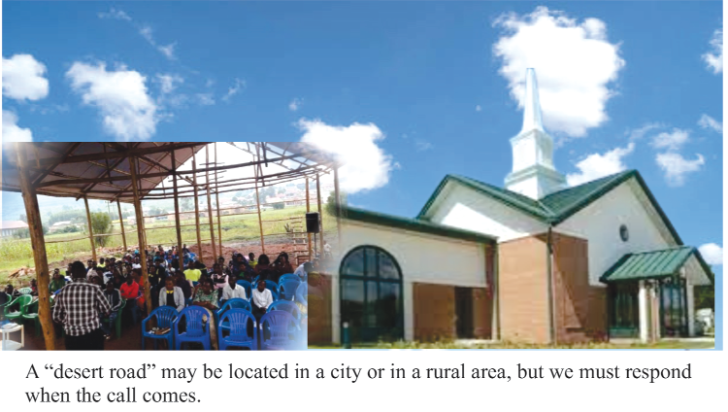
To the desert road
If an angel of the Lord told us to leave our comfortable church and go to a desert place to minister there, what would we do?
Advertisement
Let’s say the angel pointed to a dry, lonely, remote, and poor terrain. Would we go or find a good excuse not to go?
A desert place is described as “any large, extremely dry area of land with sparse vegetation.” It is any location or situation that is unprofitable, not exciting, and unappealing.
If we were like Jonah, we would run away to a more comfortable location, because Nineveh, where God asked him to go and preach, was a wicked place, like a desert road.
However, if we were like Philip, we would act differently. The angel told him, “Go south to the desert road that goes down from Jerusalem to Gaza” (Acts 8:26). Philip needed to know he was being sent to a “desert road.”
The church in Samaria which he and others had planted was flourishing and his popularity was soaring. “Impure spirits came out of many, and many were healed. So there was great joy in that city” (Acts 8:4-8). Very exciting. This was where to be, not a desert road.
The angel did not tell him anything about this desert road. Pretty much like God telling Abram to go to a land he would show him without telling him how the place was. Abram simply answered, “Yes, Lord,” for obedience is better than sacrifice and excuses.
Philip obeyed the angel, left the comfort zone of a growing church, and arrived at the desert road, where he met a devout Ethiopian Eunuch blindly reading Isaiah 53. He led the Ethiopian to believe in Jesus and baptised him. That encounter opened East Africa to the gospel and the subsequent widespread revivals in that region.
An American author, Neil Strauss, says, “Nothing worthwhile normally emanates from a comfort zone.” Or, as someone else put it, “You never change your life until you step out of your comfort zone.”
We all love the soft spots of life where we can relax and indulge in coziness. But such comforts often produce stagnated vision that doesn’t yield much fruit.
That is why true achievement is not what has been obtained but the obstacles one has to overcome in order to obtain it.
Today, there is a mixture of both comfort zone Christian service and desert road experiences. The day I entered a city church that was fully air-conditioned, the feeling was good.
But the whole time that I sat in that comfortable environment, my mind was far away in a village in the Salaga District where services are held under trees.
Church members bring stools from their homes to sit on while others sit on stones and concrete blocks. The preacher often turned the carrier of his rickety bicycle into a pulpit.
Recently, I read the mission chronicles of an evangelist-turned-pastor who travelled to villages in the Upper East Region on his bicycle across flooded rivers to minister to small congregations. There were times when he dragged his buttocks on a log over a stream because he was too scared to walk on it.
No wonder Rev. Dr Billy Graham once said at a conference of itinerant evangelists in Amsterdam, “Some of you evangelists work harder and under severe conditions than Billy Graham, and the Lord who called you knows about it.”
Church growth analysts have deduced that comfort zone Christianity produces weak and lazy believers who have stopped growing in the Lord.
At comfort zones, we fall at the least temptation, readily compromise morals and faithfulness, and produce little or no fruit in our quest for discipleship. But Christianity is at its sharpest under trials and difficulties.
When a call came to a congregation to send some of their members to a city suburb to plant a branch there, the leaders refused to respond to the call. They felt comfortable where they were and didn’t want to be disturbed by a call to the desert road.
Despising desert places of hard and rough situations often make us fail in our Christian witness and the call to go and make disciples of all nations.
The histories of churches in Ghana and elsewhere recount the sacrifices of founders and missionaries who braved harsh conditions on their desert roads to establish their denominations, including those who lost their lives in the process. We applaud such people.
All his life, the Lord Jesus himself, the pioneer and perfector of our faith, followed desert roads all the way to calvary where he sacrificed his life for us. He is our perfect example of desert road experiences and pursuits.
A “desert road” may be located in a city or in a rural area, but the people residing there may be difficult to approach or dangerous to associate with, yet we must respond when the call comes—as Philip did.




